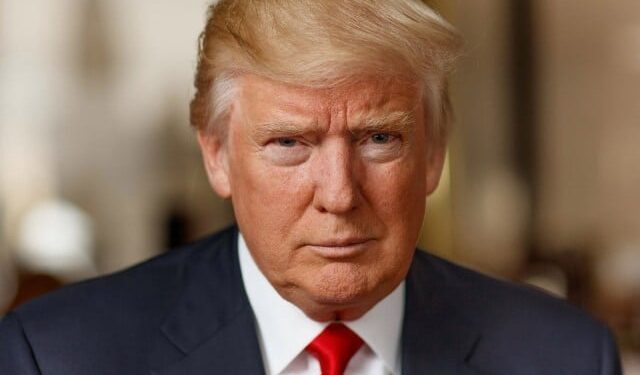Washington, D.C. – Former U.S. President Donald Trump has once again sparked a geopolitical debate by suggesting that Greenland should be part of the United States for national and international security reasons. His remarks came during a meeting with NATO Secretary General Mark Rutte, where Trump expressed his long-standing interest in the Arctic territory.
Trump’s Bold Statement on Greenland
During the discussion, Trump reaffirmed his belief that Greenland must be part of the United States. When asked about any concrete plans for Greenland’s annexation or acquisition, he responded, “Okay, I think it will happen.” This statement immediately drew global attention, given the strategic importance of Greenland and the diplomatic implications of such a move.
Pointing to NATO Secretary General Mark Rutte, Trump said, “Now, here is a person who can help the U.S. annex Greenland. We also need it for international security.” However, Rutte was quick to distance himself from the conversation, cutting off Trump’s remarks and stating, “If there is a discussion on Greenland, I will leave this discussion because I do not want to push NATO into it.”
Greenland’s Strategic Importance
Greenland, the world’s largest island, is an autonomous territory of Denmark with a small population of around 56,000 people. While it enjoys self-governance in many aspects, Denmark retains control over its foreign affairs, defense, and monetary policy.
The Arctic territory is of immense strategic importance due to its geographical location between North America and Europe. It hosts the Thule Air Base, the northernmost U.S. military installation, which plays a crucial role in missile defense and surveillance. The region is also rich in natural resources, including oil, gas, and rare minerals, making it an attractive prospect for economic expansion.
Trump’s Previous Interest in Greenland
This is not the first time Trump has voiced interest in Greenland. In 2019, during his presidency, reports surfaced that he had suggested the possibility of purchasing Greenland from Denmark. The proposal was widely dismissed by Danish officials, with then-Prime Minister Mette Frederiksen calling the idea “absurd.” In response, Trump canceled a planned visit to Denmark and criticized Frederiksen’s reaction.
Despite the diplomatic fallout, Trump has continued to emphasize Greenland’s strategic importance for U.S. national security, citing concerns over increased Russian and Chinese presence in the Arctic. He has argued that U.S. control over Greenland would enhance security measures and strengthen America’s geopolitical standing in the region.
NATO’s Response and European Commitments
During the meeting, NATO Secretary General Mark Rutte assured Trump that Europe is prepared to allocate an additional $800 billion for defense. This commitment comes amid growing concerns over military buildups by Russia and China, both of whom have been increasing their presence in the Arctic and advancing their weapons programs.
Rutte’s statement underscores NATO’s focus on maintaining a strong deterrent against potential threats. However, he was careful to steer the conversation away from Greenland, suggesting that any discussion about the island should remain outside NATO’s agenda.
Geopolitical Implications of a U.S. Greenland Takeover
If the United States were to pursue control over Greenland, it would likely face significant resistance from Denmark, Greenland’s local government, and the international community. Such a move would challenge international norms and agreements, potentially leading to diplomatic conflicts.
Additionally, Greenlandic leaders have expressed their desire for greater autonomy rather than becoming part of another nation. Greenland’s Prime Minister Múte Bourup Egede has previously stated that the territory’s goal is to eventually achieve full independence from Denmark, rather than becoming a U.S. territory.
Russia and China’s Interests in the Arctic
Trump’s mention of Greenland’s importance for international security stems from growing competition in the Arctic. Both Russia and China have been expanding their influence in the region. Russia has been increasing its military presence, reopening Soviet-era bases, and conducting Arctic military exercises. Meanwhile, China has declared itself a “near-Arctic state” and has invested heavily in infrastructure and scientific research in the region.
The U.S. has been wary of China’s economic interests in Greenland, particularly after Beijing attempted to finance infrastructure projects, including airports. This raised alarms in Washington, leading to increased diplomatic engagement with Greenlandic officials to counter Chinese influence.
Potential Economic Benefits for the U.S.
Beyond security concerns, acquiring Greenland could bring significant economic benefits to the United States. The Arctic region is believed to hold vast reserves of untapped oil, gas, and rare earth minerals, which are essential for modern technology and defense industries. With global demand for these resources rising, control over Greenland’s natural wealth could provide the U.S. with a strategic economic advantage.
However, any such move would require navigating complex legal, diplomatic, and political challenges. The U.S. would need to address Greenland’s self-determination rights, negotiate with Denmark, and gain international support—an unlikely scenario given the widespread opposition to Trump’s previous proposal.
Conclusion: A Controversial Prospect
Trump’s latest remarks on Greenland once again highlight his unconventional approach to geopolitics. While his statement may not signal an official policy shift, it reflects his long-standing belief in Greenland’s strategic value to U.S. national security.
Despite his confidence that Greenland will “eventually” be part of the U.S., significant obstacles remain. Denmark has made it clear that Greenland is not for sale, and the island’s leadership has no interest in becoming an American territory.
With the Arctic emerging as a key battleground for global influence, the U.S. will likely continue to strengthen its presence in the region through diplomatic, economic, and military strategies rather than outright acquisition. As the world watches Arctic developments closely, the debate over Greenland’s future remains an open question, one that is sure to resurface in future geopolitical discussions.

























